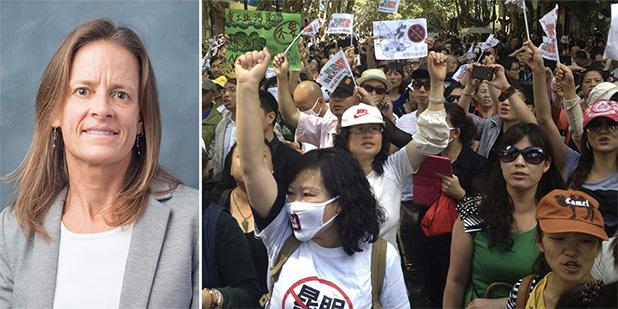Join us for a free one-day workshop for educators at the Japanese American National Museum, hosted by the USC U.S.-China Institute and the National Consortium for Teaching about Asia. This workshop will include a guided tour of the beloved exhibition Common Ground: The Heart of Community, slated to close permanently in January 2025. Following the tour, learn strategies for engaging students in the primary source artifacts, images, and documents found in JANM’s vast collection and discover classroom-ready resources to support teaching and learning about the Japanese American experience.
Video: Teresa Wright Looks at Protest and Resistance in China

The hundreds of worker protests, the #MeToo push against sexual harassment and gender discrimination, the mobilization of church members to oppose the destruction of their meeting places and various gatherings to oppose government decisions on schools and land use and tens of thousands of other protests make it clear that Chinese citizens are far from docile, and regularly and vociferously rise up in collective protest. In some cases they have successfully applied pressure, forcing political and economic elites to satisfy their demands. In others, they have been brutally suppressed. More often than not, however, the results have been mixed. Examining how, when, and why individuals and groups have engaged in contentious acts, and how the targets of their complaints have responded, sheds light on the stability of China’s existing political system, and its likely future trajectory.
Video is also available on our YouTube channel.
Teresa Wright is professor and chair of political science at California State University, Long Beach. Dr. Wright studied at Santa Clara University and UC Berkeley. She’s the author of The Perils of Protest: State Repression and Student Activism in China and Taiwan, Accepting Authoritarianism: State Society Relations in China’s Reform Era, Party and State in Post-Mao China, and Popular Protest in China. She is the editor of the recent Handbook of Protest and Resistance in China. Prof. Wright was a discussant at our China’s Growing Pains conference in 2016.
Links
Featured Articles
Please join us for the Grad Mixer! Hosted by USC Annenberg Office of International Affairs, Enjoy food, drink and conversation with fellow students across USC Annenberg. Graduate students from any field are welcome to join, so it is a great opportunity to meet fellow students with IR/foreign policy-related research topics and interests.
RSVP link: https://forms.gle/1zer188RE9dCS6Ho6
Events
Hosted by USC Annenberg Office of International Affairs, enjoy food, drink and conversation with fellow international students.
Join us for an in-person conversation on Thursday, November 7th at 4pm with author David M. Lampton as he discusses his new book, Living U.S.-China Relations: From Cold War to Cold War. The book examines the history of U.S.-China relations across eight U.S. presidential administrations.




